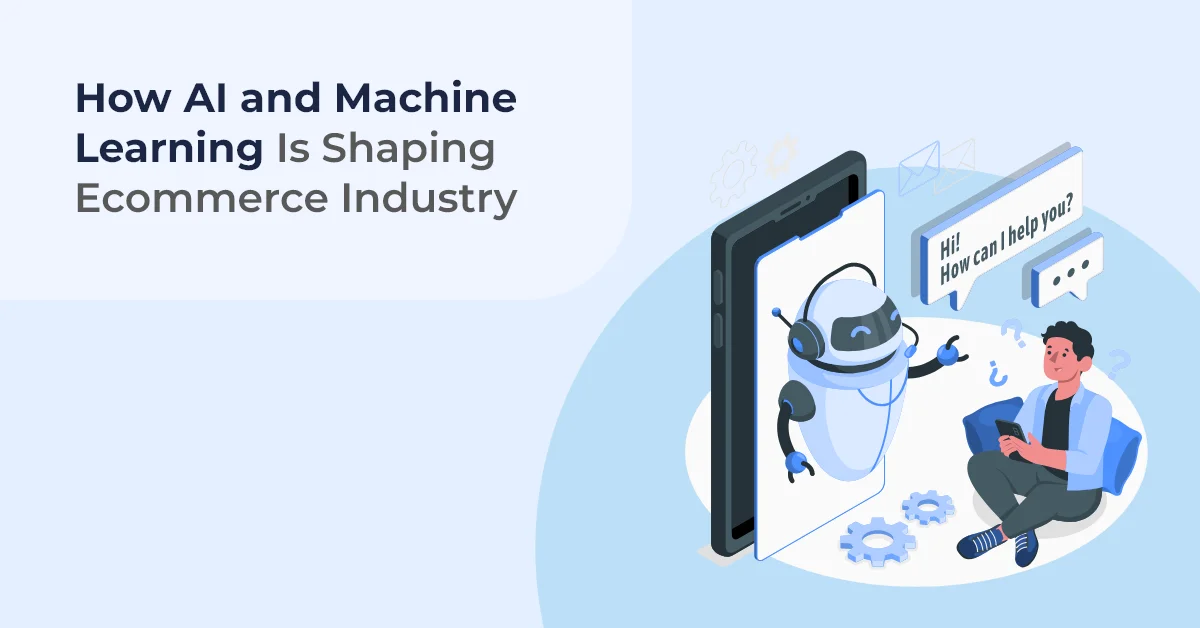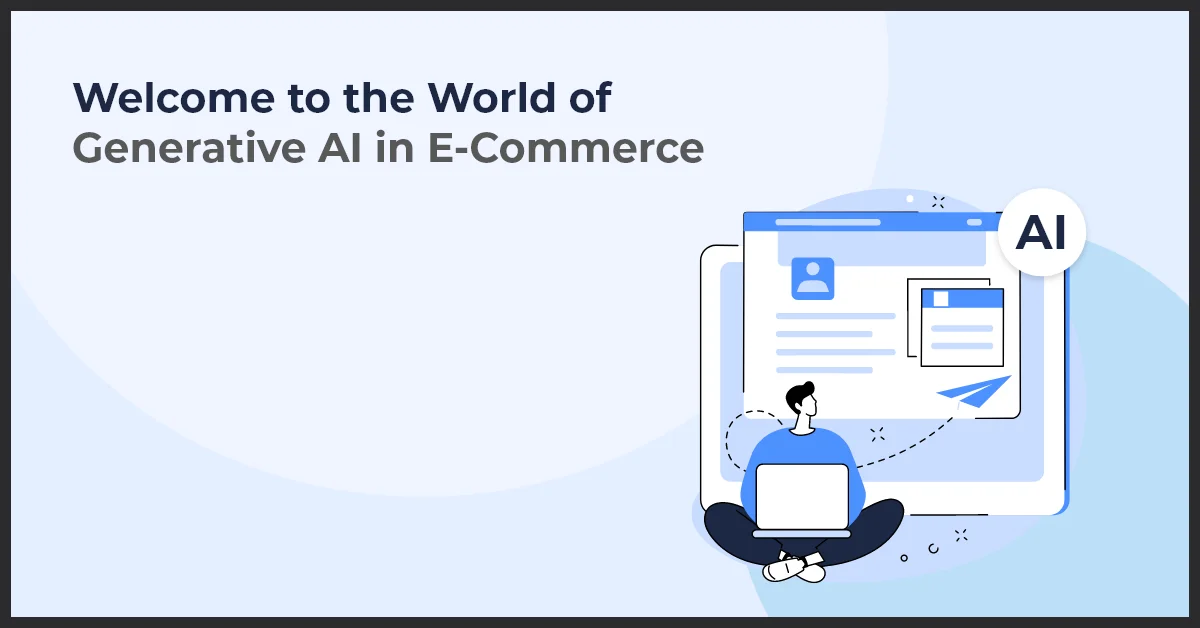How AI and Machine Learning Is Shaping Ecommerce Industry

Published on: February 17, 2022
Updated on: October 24, 2024
1272 Views
- Ecommerce
18 min read
The eCommerce industry has grown exponentially over the last decade. From a $680 billion industry back in 2011, it crossed $5 trillion in 2021. Back in the day, it commanded 3% of the total retail share and current estimates suggest it would be near a 20% market share by 2023. Though the Covid-19 pandemic has given a major push to this segment, the growth of the eCommerce business space can be primarily attributed to the evolution of technology.
Technology & Ecommerce
The eCommerce industry has a symbiotic relationship with technology and its evolution. Without the internet, there would have been no eCommerce. Without the mass adoption of computers and smartphones, e-commerce wouldn’t have been a $5 trillion industry. Technology has been the enabler and the driving factor behind the growth of eCommerce businesses.
Ecommerce on its part has been an early embracer of technology. Talking about technology in the eCommerce business, artificial intelligence, and machine learning would immediately strike your mind. As someone who is part of this industry or an observer, you would have heard and read a lot about these technologies. While eCommerce came as a major disruptor in the retail business, AI and machine learning are disrupting the eCommerce industry itself. It is estimated that by 2025, 95% of all customer interactions on eCommerce stores would be managed by AI.
What Are AI and Machine Learning and How Are They Different?
Machine learning and artificial intelligence are often mentioned interchangeably in common parlance, but they aren’t the same. Before we dive further into how AI and machine learning are shaping the eCommerce industry, let us look at what they are and how they are different from one another.
Artificial Intelligence
Artificial intelligence uses the computing power of machines to imitate the human mind’s problem-solving and decision-making abilities. This is a technology that is known for exhibiting human behavior. Unlike traditional computer programs that are built to perform tasks based on inputs, AI tools can reason with data, sense opportunities, and adapt to different scenarios like the human mind.
Machine Learning
Machine learning depends on data and algorithms to perform actions and make predictions. It is a continually learning tool that comes up with more accurate outputs when it is exposed to more data. The more information it gathers the better it becomes in predicting outcomes. It performs analysis based on the input data independent of any human interference.
Technically, machine learning is a sub-branch of artificial intelligence. AI is the technology whereas machine learning is the process. AI empowers machines to imitate human behavior such as reasoning, sensing opportunities, threats, etc. The main goal of AI is to make computer systems smarter whereas machine learning is focused on learning from data and analyzing trends to give the most accurate outputs.
Pro Tip: Leverage machine learning for continuous improvement. The more data it processes, the more accurate its predictions become, making it essential for data-driven decisions and automating tasks with minimal human intervention.
Benefits of AI & Machine Learning for Ecommerce Business
Artificial intelligence and machine learning are revolutionizing eCommerce and helping online stores in many ways. Let us look at some of the benefits deploying AI and machine learning will provide to you:
Increased Conversions
Conversion is the most important parameter to measure the success of an online store. It is measured using the ratio of transactions to user sessions on a store. Globally, online stores have an average conversion rate of 2.58%.
AI and machine learning can boost conversion rates through smart search results instead of generic ones. For instance, a user who has been reviewing an Apple iPhone in a store is more likely to buy flagship Android phones instead of budget ones. Hence, their product recommendations on the store or social media feeds should have offers on premium phones instead of budget phones.
Streamlined Search Function
Not all eCommerce customers are great with keywords and searches. While your store may be stocked with products, your success rests on how easily customers can find the products they are looking for. Searches cannot be keyword-based alone and AI allows you to enable smart searches such as predictive text, autocorrect typos, and search results based on customers’ demography and past buying habits.
Personalized Store Experience
Your customer doesn’t want to be treated as an ‘average customer’ but expects personalized services and offers just how they receive at retail outlets. The main thrust in the eCommerce business has been personalization. AI and machine learning are helping stores adapt to the unique needs and demands of customers. For instance, a customer who has recently bought an iPhone would expect the store to suggest the best cases for an iPhone whenever he or she is looking for a case. The better your store is with product recommendations, the more are your odds of increased sales.
Improved Customer Service
Did you know an average eCommerce store has only 25-30% returning customers? The real fight in this business is to earn customer loyalty and AI and machine learning can help. AI-powered chatbots can be employed to offer the first line of support services to your customers and optimize the use of human resources. Modern chatbots can communicate with customers in natural language and answer a majority of their queries.
Advanced Forecasting
eCommerce stores need to strike the right balance between demand and supply to optimize their warehousing capacity. AI helps store owners make data-backed decisions. Sales trends and future demands are automatically processed by AI tools and help you with accurate forecasting. These tools can also detect anomalies in the sale of products or spot products that are losing customer interest.
Steps to Adapt AI and Machine Learning in Ecommerce
1. Price Optimization
Ecommerce shoppers are price-sensitive and more than 50% of customers do price comparisons before placing an order. If the products cost more or are the same as retail stores, customers are likely to prefer physical shopping with the touch and feel experience. Dynamic pricing or price optimization is employed to offer the same products at different prices based on demand, supply, competition, etc. AI and ML can be employed in price optimization to take this a step further as they factor buyers’ intent, time of the day, urgency, and other factors that influence buying decisions.
2. Predictive Analysis
AI and machine learning can tell you more about your customers than you can think of. Based on their activity in your store, these technologies can predict whether the customer is likely to buy the product or simply window shopping. They can give you insights on the other products customers might need based on their overall search activities. AI algorithms can offer you meaningful insights that let you target the customer more proactively such as with tailored offers or discount coupons.
3. Visual and Voice Search
Ecommerce stores have traditionally relied on text-based searches and hence, the focus in the past had always been on SEO. However, we are seeing a shift toward visual and voice searches. Google Lens and other similar tools let users shop for products they can take pictures of. Similarly, Apple’s Siri and other voice assistant tools are allowing users to shop online using voice commands. Integrating machine learning helps in improving voice and visual search on stores and thereby increases conversions.
4. Product Recommendation
Product recommendations are the best way to increase sales and retain customers in a store. When you suggest to customers the right products your store would see increased sales. For instance, when customers buy a printer from the store, they are likely to need printing paper and ink supplies. Use machine learning to understand the frequency at which customers shop for ink supplies and use email marketing or display products on the recommended list to ensure more sales.
5. Inventory Management
Inventory management is complex and when stores sell thousands of different products, it can become a herculean challenge for the team managing the stocks on the store. Inventory management is the job where machine learning can help. They can track the demand of products during different seasons, change in sale trends, etc. and manage your inventory accordingly.
Chatbots: Revolutionizing Customer Service and Engagement
In the dynamic world of e-commerce, staying ahead of customer service trends is crucial for success. The emergence of AI-powered chatbots has transformed the landscape, offering businesses an unprecedented level of customer interaction. With these technological advancements, companies are now capable of providing instant support and engagement, catered specifically to the individual needs of each customer.
Technological Advancements in Chatbots for E-commerce
Chatbots have come a long way from their humble beginnings. The latest chatbot technologies are not just reactive but proactively engage with customers, thanks to advanced machine learning algorithms. They can understand language nuances, context, and user preferences, allowing them to deliver a highly personalized shopping experience.
Pro Tip: Utilize advanced chatbots to enhance customer experience. Their ability to understand nuances and preferences enables personalized interactions, driving engagement and increasing conversion rates in your e-commerce business.
Enhancing the Customer Experience through Instant Support and Engagement
With the expectation of immediate gratification in today’s fast-paced digital world, chatbots are the perfect solution for e-commerce businesses. They provide instant support 24/7, answering queries, guiding through the sales funnel, and handling customer service issues, which significantly enhances the overall customer experience.
Success Stories of Chatbots Improving Business-Customer Interactions
- Order Tracking: Chatbots can provide real-time updates on orders, giving customers peace of mind and reducing support team workload.
- Personal Shopping Assistants: AI chatbots act as personal shopping assistants, making recommendations and helping users navigate through product options efficiently.
- Feedback Gathering: They are excellent tools for collecting customer feedback, allowing businesses to improve and adapt their offerings swiftly.
One notable success story includes an e-commerce giant that implemented a chatbot, resulting in a 25% increase in customer satisfaction and a significant drop in support calls. This example underlines the potential that chatbots have to revolutionize customer interactions and drive business growth.
Dynamic Pricing Strategies in the AI Era
Ever wondered how online retailers manage to offer just the right deal at the perfect moment? It's not magic— it's machine learning, a key player in today's dynamic pricing strategies. This technique is reshaping how ecommerce businesses remain competitive and customer-centric, adjusting prices on-the-fly to match demand, inventory, and consumer behavior.
The Machine Learning Edge in Pricing
Utilizing algorithms that learn from data, ecommerce platforms can now implement dynamic pricing strategies that once required a team of analysts. These AI-driven systems assess multiple factors like competitor prices, market demand, and individual customer preferences to recommend optimal pricing adjustments. As a result, businesses are not just reactive but proactive, staying one step ahead in the game of profit maximization.
Real-Time Adjustments for Maximized Profits
In an online shopping environment where prices can fluctuate almost as frequently as the stock market, businesses leverage AI to adjust prices in real-time. This responsiveness to market conditions ensures that retailers can attract consumers with competitive prices while protecting their margins.
Navigating the Ethical Landscape
But it's not all about algorithms and earnings; ethical considerations come into play as well. The perception of dynamic pricing among consumers can be a double-edged sword. Shoppers love a good deal, but they're also wary of feeling manipulated. Transparency and fairness are crucial to maintaining trust—and a loyal customer base—in the era of AI-driven pricing.
- Effectiveness in rapid price adjustment to optimize sales
- Higher customer satisfaction through personalized pricing
- Consideration of ethical lines and customer trust
As we continue to navigate the complex interplay between technology and commerce, dynamic pricing represents just one of the many ways AI and machine learning are proving to be indispensable tools for online businesses looking to thrive in an ever-evolving marketplace.
Tackling E-commerce Fraud with AI
As the digital market continues to expand, e-commerce fraud poses a significant threat not just to revenue, but to the hard-earned trust of customers. This is where AI and machine learning come to the rescue. By constantly learning and adapting to new fraudulent patterns, AI systems are the unsung heroes in the fight against cybercrime.
Machine Learning Techniques for Fraud Detection and Prevention
Machine learning algorithms excel at identifying inconsistencies in large datasets. These powerful techniques can sift through vast amounts of transaction data in real-time, flagging suspicious activities that might indicate fraud. From recognizing unusual purchase patterns to detecting identity theft, AI-driven systems are constantly updating their knowledge base to outsmart even the most cunning fraudsters.
Minimizing Losses and Maintaining Customer Trust
The cost of fraud extends beyond monetary loss. It can tarnish a brand's reputation and shake customer confidence. Integrating AI into e-commerce platforms helps companies stay one step ahead, securing data and financial transactions. This proactive approach not only minimizes potential losses but also reassures customers that their information is safe, solidifying their trust in the brand.
The Delicate Balance: Security vs. Customer Convenience
There's a delicate balance to strike between ensuring security and maintaining an effortless shopping experience. Excessive security measures can lead to false positives and frustrated customers, while too little can leave the gates wide open for fraudsters. AI-driven systems are advancing towards an equilibrium, ensuring that customers enjoy a seamless checkout process without compromising on security.
- Machine Learning: The backbone of modern fraud prevention strategies.
- Customer Trust: A crucial commodity that AI helps to nurture by safeguarding transactions.
- Balance: Achieving the right mix of security and convenience is key to retaining customers.
Thus, as we embrace the future of online shopping, AI and machine learning play a pivotal role in creating an environment where transactions are both seamless and secure, fostering growth and customer loyalty in the e-commerce sector.
Pro Tip: Implement AI and machine learning in your fraud detection strategies. These technologies analyze transaction data in real time, ensuring secure customer experiences while minimizing losses and maintaining trust in your brand.
Voice-Enabled Shopping: The Next Frontier of E-commerce
Voice-enabled shopping is not just a fleeting trend; it's a transformative shift in how consumers interact with online stores. As smart speakers and voice assistants like Amazon's Alexa, Google Assistant, and Apple's Siri become household staples, the e-commerce sector is poised to adapt and thrive in this new environment.
The Rising Tide of Voice Search and Shopping
It's clear that the convenience of simply speaking to a device to shop rather than clicking through several pages is resonating with consumers. With voice search and commands, customers are finding it increasingly appealing to shop hands-free, multitasking as they go about their daily routines.
Optimizing for Voice Search Compatibility
E-commerce platforms are rapidly evolving to accommodate this surge in voice search. To stay competitive, businesses must ensure that their online storefronts are discoverable and navigable through voice commands. This entails refining product descriptions, leveraging natural language processing, and focusing on conversational queries that customers are likely to use.
Customer Adoption Rates and Buying Habits
Adoption rates of voice-enabled devices continue to climb, signaling a new wave in buying habits. While some shoppers remain hesitant, attributing to privacy concerns or habit, an increasingly tech-savvy customer base is embracing voice search as part of their buying journey. This shift creates enormous potential for e-commerce platforms attuned to the nuances of voice search behavior.
- Personalized Shopping Experiences: Voice assistants are becoming more adept at providing personalized recommendations based on user history and preferences.
- Analyzing Customer Behavior: E-commerce businesses are utilizing machine learning to interpret voice search data and refine customer experiences.
- Enhancing Discoverability: By optimizing for voice, e-commerce platforms enhance discoverability, making it easier for customers to find and purchase products with simple voice commands.
As e-commerce ventures into this new frontier, embracing voice-enabled shopping becomes not just an option but a necessity for staying ahead. The convenience and growing ubiquity of voice interactions are paving the way for a more seamless and engaging online shopping experience.
Revolutionize Your E-Commerce Strategy with AI-Powered Content Creation
As the world of e-commerce grows ever more competitive, staying ahead of the curve is essential for retailers. One area witnessing a massive transformation thanks to artificial intelligence is content creation. E-commerce brands are turning to AI-driven tools to generate marketing content at an unprecedented scale, ensuring that each product shines and appeals to the right audience.
Exploring AI-driven Content Generation for E-commerce Marketing
Imagine a world where your e-commerce platform could adapt its product descriptions, blog posts, and promotional materials in real-time, delivering personalized experiences to every customer. AI-driven content generation tools are making this a reality. By analyzing customer data and learning from user interactions, AI can weave engaging narratives that speak directly to your audience's needs and preferences.
The Benefits of Automated Product Descriptions and Personalized Marketing
With automated product descriptions, retailers can quickly populate their online catalogs with rich, SEO-friendly text that entices and informs shoppers. But it doesn't stop there; personalized marketing is another gem in the AI content crown. From email campaigns to social media posts, AI algorithms can determine the best content strategy for individual consumers, improving engagement and boosting conversion rates.
Addressing Concerns Over Authenticity and Brand Voice
While the advantages of AI in content creation are clear, there are valid concerns about maintaining authenticity and a consistent brand voice. However, as AI technology evolves, it is learning not just to mimic but encapsulate the essence of a brand's messaging, ensuring that the automated content resonates with the brand's values and tone. With careful oversight and the right inputs, AI can serve as a versatile accomplice to creative teams, enhancing rather than replacing the human touch.
In an age where personalization and efficiency are king, AI and machine learning are not just shaping the future of e-commerce content creation; they're redefining it. Brands that embrace this technology are setting themselves up for success in the dynamic, ever-evolving online marketplace.
Enhancing Payment Security with Machine Learning
As e-commerce grows, so does the ingenuity of fraudulent activities. But thanks to machine learning, secure payment processing is evolving to outsmart such threats. This powerful technology enhances the safety of each transaction, ensuring a secure shopping experience for customers while preserving their trust in online marketplaces.
Combating E-commerce Payment Fraud
The e-commerce sector is continuously waging a war against payment fraud, employing sophisticated machine learning algorithms to detect and prevent unauthorized transactions. These systems learn from patterns in vast sets of transaction data, identifying anomalies that could indicate fraudulent activities.
The Delicate Balance in Payment Processing
Finding the sweet spot between offering a seamless payment experience and implementing stringent security measures is critical. Machine learning strikes this balance, rapidly analyzing and approving genuine transactions, while flagging suspicious activities—all without adding friction for the customer.
- Real-time Fraud Detection: Machine learning models operate in real time, efficiently distinguishing legitimate transactions from fraudulent ones.
- Adaptive Learning: As fraudsters evolve their tactics, so do machine learning systems, adapting to novel threats continuously.
- Customer-Centric Security: By minimizing false declines, machine learning keeps customer inconvenience at bay, promoting a smoother checkout process.
Key Takeaways
- The eCommerce industry has grown rapidly due to technological advancements and the widespread use of the internet and smartphones.
- Artificial intelligence and machine learning are key in enhancing E-commerce customer interactions and store experiences.
- AI and machine learning help in optimizing prices, predicting customer behavior, and improving search functions, leading to increased conversions.
- AI-powered chatbots provide instant customer support and personalized services, improving overall customer satisfaction.
- Voice-enabled shopping is an emerging trend in E-commerce, allowing customers to shop conveniently using voice commands.
Final Thoughts
Ecommerce is evolving from being just various digital commerce touchpoints with product listing, carts, and payment gateways, to a wholesome shopping experience. Stores are increasingly interacting with customers at multiple levels. In addition, artificial intelligence and machine learning are shaping the future of eCommerce from offering tailored products to predicting customers’ needs.
These technologies empower you to offer more personalized services to your customers. Combining these with other technologies such as AR (augmented reality) and VR (virtual reality), you can now also replicate in-store shopping experiences for your customers. If you are not leveraging these technologies for your eCommerce business, you will soon fall behind in the race. Fasten your seatbelts and deploy AI and machine learning into your eCommerce business today.
If you wish to leverage the true power of AI and machine learning in eCommerce but don’t know where to begin, Growth Natives can help you. As experts in the eCommerce domain, we help clients deploy AI-based algorithms in their online stores. From integrating virtual assistants to enabling smart search, we can power your store to improve conversions and profits. To discuss the details of your project, write to us at info@growthnatives.com or visit our website.
Frequently Asked Questions
AI enhances eCommerce by improving customer personalization, automating processes, optimizing inventory management, predicting trends, and providing data-driven insights for better decision-making and increased sales.
AI improves customer support through chatbots, automated responses, and personalized assistance, leading to faster resolution times, enhanced customer satisfaction, and reduced operational costs.
AI and machine learning analyze customer behavior by processing vast amounts of data to identify patterns, preferences, and trends. This enables businesses to tailor marketing strategies and improve customer experiences.
Businesses face challenges like data quality and integration issues, high implementation costs, lack of skilled personnel, resistance to change, and ensuring compliance with data privacy regulations.
The future of AI in eCommerce includes advanced personalization, improved predictive analytics, seamless integration with various platforms, enhanced supply chain automation, and smarter customer service solutions.



